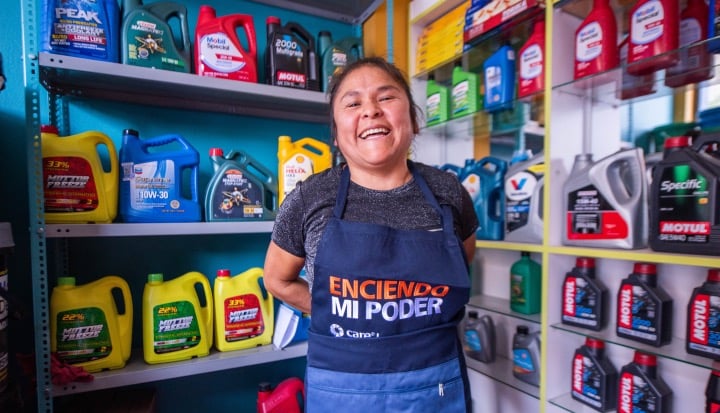Women entrepreneurs represent a trillion-dollar economic growth opportunity with benefits that ripple through households and communities – this should be enough to inspire action, but sadly it’s not. And despite the proliferation of gender equality strategies, gender-focused financial inclusion policies, entrepreneurship support programs, and extensive evidence that women are worth investing in, we’re still only skimming the surface of tapping into this potential. And we are not designing intentionally enough for the barriers that women face.
At CARE, we recently closed out our Ignite program and launched our Strive Women program, both supported by the Mastercard Center for Inclusive Growth, and both focused on growth-oriented entrepreneurs, especially women, in Pakistan, Peru & Vietnam. Through Ignite, we were able to unlock 154.9 million USD in loans and directly support 150,000+ entrepreneurs, primarily women. To mark this milestone, we brought together thought leaders from the world of women’s financial inclusion to discuss impactful women-centered programming. Contributors included local implementing partners, peer organizations, research institutions, and funders.
Discussions focused on three strategies we employed through Ignite that led to impact for women entrepreneurs:
- Invest in holistic models that sustainably support growth-oriented entrepreneurs. In our Ignite program this included increased access to tailored finance, shifting gender norms, addressing the gender digital divide, and demand-driven support services (i.e. skills building, support networks, etc).
- Diverse local partnerships are fundamental to delivering these comprehensive models, especially partnerships with financial service providers. For Ignite, our partners ranged from large banks and micro-finance institutions to small fintechs, each bringing different skills and expertise to the table. One provider can’t do it all – having multiple partnerships can help increase your outreach, diversify your risk, and ultimately give women more choice in the market.
- Women-centric product design that intentionally addresses the barriers that are unique to women is fundamental to ensure women get real value from products and services – that it really solves a problem for them as customers. This was crucial to Ignite’s success. In Peru, for example, this resulted in a loan product being designed with Financiera Confianza which addressed their need for short-term, flexible loans to manage seasonal cash flows. Eligibility criteria were adjusted, removing the need for a husband as a co-signer and allowing references instead of traditional credit history. Breast cancer screening insurance was also included in the product, following requests from women entrepreneurs.
Future Challenges
While the Ignite program revealed proven strategies for success, it also highlighted the biggest challenges hindering growth for women entrepreneurs. During the event, we heard from three experts: a childcare specialist; a green business specialist; and a measuring financial health specialist. Through Ignite, time poverty and the link to mental health and stress emerged as a critical issue, with women accessing digital training mostly late at night, indicating a need for both training and rest- we can’t expect women to get trained all the time, they need rest as well. The COVID-19 pandemic underscored women’s vulnerability in sectors like food production and retail, urging a shift towards less climate-vulnerable sectors such as green businesses. Furthermore, it is essential to look at and accurately measure women’s holistic financial health, including time use and stress levels. With this in mind, CARE will be piloting new interventions through Strive Women, which specifically address childcare challenges and how to grow the presence of women in green businesses.
Measuring financial health also emerged as a critical need and is central to the Strive Women program. Financial health has multiple definitions, but ultimately, we want women entrepreneurs to be financially resilient, have confidence and control, and a good quality of life by being able to access and use a range of financial products and services that meet their needs and supports their growth. So, in addition to measuring traditional financial resilience and sustainability metrics, we will measure factors like time use and stress levels, which are key barriers to women’s quality of life, and ultimately her ability to fully realize her economic potential.
The event generated a vibrant exchange of insights and experiences and reinforced the importance to me of bringing thought leaders and practitioners together to discuss how we all show up in the ecosystem and leverage our strengths to support sustainable and gender-intentional solutions for women-led small businesses.
CARE and the Mastercard Center for Inclusive Growth share a commitment to designing innovative programs and partnerships centered around gender equality and inclusive growth, and we look forward to deepening this network through these exchanges, and through Strive Women.
Join us on this exciting journey to build a powerful ecosystem of support focused on improving the financial health of women entrepreneurs, scaling our impact, and driving lasting change.










